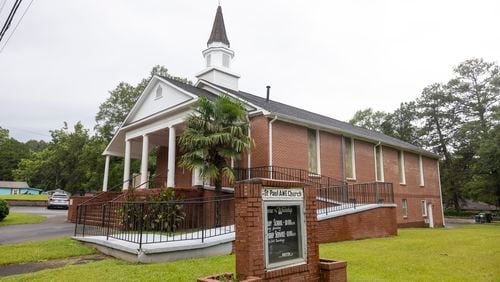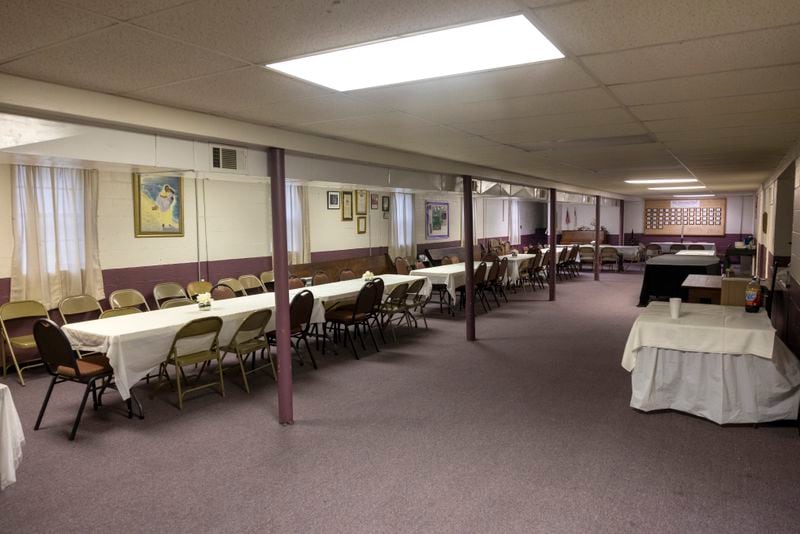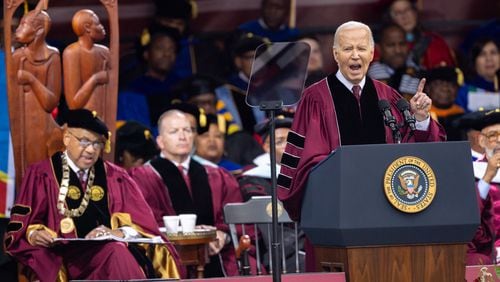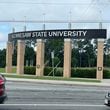In 2020, St. Paul AME Church in Hogansville applied to be a polling location. The small town of just over 3,000 people in Troup County is home to one polling place at the public library on the west side of town.
But tracks that divide Hogansville can lead to stopped trains making barriers to get to it.
“It just cut the town in half,” said the Rev. Francis Hunter, pastor at St. Paul at the time. “So they couldn’t get across, and the train could be stopped there for hours on end ... and you’ve got to go a great, great distance in order to try to get around.”
Combined with wanting to accommodate residents who lacked access to transportation, the church thought its facility could be a solution. In August 2020, the county’s Board of Elections voted to approve the precinct to operate for the November elections.
Three years later, St. Paul is a voting location, but only for city elections. For county, state and federal races, voters still head to the public library.
St. Paul’s desire to host voters each election is stalled. Those pushing for it say that’s thanks to unnecessary delays and changes to the makeup in the county’s Board of Elections, which was altered in 2021 by a statewide law letting county commissioners control appointments.
Georgia in the past few years has passed a series of these provisions, remaking local election boards across the state.
The efforts followed a campaign by Donald Trump and his supporters to sow distrust in the state’s election process following his loss in Georgia in 2020, despite no evidence of widespread fraud.
For instance, the Republican-majority General Assembly this year altered the previously bipartisanly appointed Ware County election board’s makeup to be decided solely by the GOP-controlled County Commission. Such changes are remaking how individual counties are handling elections, and in Troup’s case, altering past promises.
The members of the election board who supported St. Paul’s push are now on the sidelines, meaning few in the Republican-led county government are sympathetic to the church’s request to be a polling place for all elections. Combined with the fact that rural counties across the state are typically cutting back on or maintaining current polling places rather than expanding as a means of saving money, there appears no clear path for the church’s pitch.
Credit: Jason.Getz@ajc.com
Credit: Jason.Getz@ajc.com
Members of the election board in 2020, before the change, took visits to the church, where it was discovered that there were a few facility upgrades necessary for the church to be approved. St. Paul member Willie Cameron, who’s been involved in the push, said the church agreed to make the changes.
Even when the board approved the request, the fight wasn’t over. Questions swirled over whether there was enough time to legally establish it.
Georgia law requires new polling locations to be created at least 60 days before election day, and locations can’t be created or altered until 30 days after they’re advertised. Some county officials viewed that as a 90-day total timeline, which meant the board’s approval would have been too late for November. Board members believed the 30-day time frame could be within the 60-day window.
The legal confusion limited action, and a precinct wasn’t opened in time for the November 2020 election. Cameron was frustrated. “The county dragged their feet,” he said.
In 2021, following a request by the county commissioners, the Georgia General Assembly changed how Troup’s election board was selected.
Previously, the three cities in the county each selected a member, while the county Democratic and Republican parties each appointed one and an additional two were selected by the commissioners. Changes cut the number of members from seven to five and permitted the Republican-dominated County Commission to select all members. The county said it provided a more accountable board, as appointees’ performance would ultimately be the commissioners’ responsibility, while others worried it would mean a more partisan panel.
Xakota Espinoza, a spokesperson for Fair Fight Action Georgia, said laws overhauling local election boards are part of a national strategy to attack voting practices. “The strategy is to disrupt the process from every angle — from voter access to election administration and certification,” she said.
It also has led to concerns for her over a lack of representation on election boards, with Black members in particular getting ousted, Espinoza said.
The new election board in Troup agreed with the county commissioners that a new precinct wasn’t necessary for general elections.
“The prior election board … had no good data,” said Bill Stump, now chairman of the Troup election board. “There were no metrics to justify why they needed an additional precinct.”
Stump said the county isn’t convinced the train tracks inhibit voters, and there aren’t long enough wait times at the library to consider resources for St. Paul. A county document shows that the longest wait times recorded during November’s midterm elections were just about 10 minutes at the public library.
Lisa Kelly, city manager of Hogansville, agrees that the tracks aren’t the issue. She said even when a train stopped on the tracks for about four days, coinciding with the November 2021 city elections — the first where St. Paul was in use — it wasn’t a major problem.
Rather, the second precinct is necessary as the city expects to see growth in the next few years, Kelly said.
“We stand the possibility of doubling our population within three to five years,” she said. “As we grow, what does that look like for our voting public? What makes it easiest, least amount of lines, giving everyone the opportunity to vote?”
Between the 2010 and 2020 census, Hogansville only added about 200 residents. Kelly said new development, including a wave of expected new single-family homes, in the next few years will drive the population boom, but until that happens it will be hard to persuade the county to support the new voting precinct.
She also said the city needs a second precinct to accommodate Hogansville’s walking population. Stump doesn’t see it.
“If you have to drive a little way or you have to do something, that’s the price to vote,” he said. “If you can’t go more than a block to vote, are you very concerned about your vote?”
Supporters say county officials also don’t like that the new polling place would be in a Black church. Stump said he’d prefer that all precincts be in public buildings. “I would rather not be in any church that’s white or Black,” he said, though the county just last month approved reopening a precinct in a white church. Also, with high rates of early voting, Stump said that he expects to see fewer precincts in the future, not more.
Cameron expressed confidence St. Paul will eventually succeed. “It’s going to become a precinct,” he said. “We’re gonna get it corrected.”
About the Author








